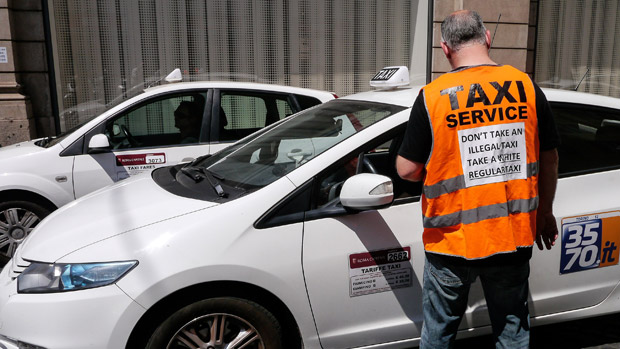Germany bans Uber taxi service – app vows to continue
The smartphone-based network says it will defy the court and keep trading despite threat of fines

A free daily email with the biggest news stories of the day – and the best features from TheWeek.com
You are now subscribed
Your newsletter sign-up was successful
A German court has banned one of the most popular services provided by Uber, the controversial cab-hailing app, in the biggest legal setback the business has faced since it was founded five years ago.
In Frankfurt, a state court ruled that the company's "low-cost" UberPop service could no longer accept passengers and that Uber would face fines if it continued.
UberPop allows users of the Uber smartphone app to connect and arrange lifts with private drivers, often at prices far lower than those charged by taxis and other vehicles available on through the service.
The Week
Escape your echo chamber. Get the facts behind the news, plus analysis from multiple perspectives.

Sign up for The Week's Free Newsletters
From our morning news briefing to a weekly Good News Newsletter, get the best of The Week delivered directly to your inbox.
From our morning news briefing to a weekly Good News Newsletter, get the best of The Week delivered directly to your inbox.
The court ruled that the ban would remain in place until later in the year when it had assessed whether the service unfairly competes with local taxis.
An Uber spokesperson said that the company would appeal against the court's decision and vowed to defy the ban.
"Germany is one of the fastest growing markets for Uber in Europe," he said. "We will continue to operate in Germany and will appeal the recent lawsuit filed by Taxi Deutschland in Frankfurt. You cannot put the brakes on progress. Uber will continue its operations and will offer UberPop ridesharing services via its app throughout Germany."
The case against Uber was brought to court by the German taxi company TDS, which offers a similar service to Uberpop, The Guardian reports. TDS spokeswoman Anja Floetenmeyer said that she welcomed the ban.
A free daily email with the biggest news stories of the day – and the best features from TheWeek.com
"We are very happy with the decision," she said. "The law says there are safety regulations for drivers and safety regulations for users, and these also apply to neo-liberal firms like Uber."
TDS chairman Dieter Schlenker said: "Uber operates with billions in cash from Goldman Sachs and Google, wraps itself in a start-up look and sells itself as a new economy saviour."
After Uber promised to flout the ban, Floetenmeyer called on the court to enforce the relevant fines. "If you get into a car, you are legally in the hands of the driver with your life and your personal health and safety," she said. "And the driver has to play by the German rules."
-
 The ‘ravenous’ demand for Cornish minerals
The ‘ravenous’ demand for Cornish mineralsUnder the Radar Growing need for critical minerals to power tech has intensified ‘appetite’ for lithium, which could be a ‘huge boon’ for local economy
-
 Why are election experts taking Trump’s midterm threats seriously?
Why are election experts taking Trump’s midterm threats seriously?IN THE SPOTLIGHT As the president muses about polling place deployments and a centralized electoral system aimed at one-party control, lawmakers are taking this administration at its word
-
 ‘Restaurateurs have become millionaires’
‘Restaurateurs have become millionaires’Instant Opinion Opinion, comment and editorials of the day
-
 Will AI kill the smartphone?
Will AI kill the smartphone?In The Spotlight OpenAI and Meta want to unseat the ‘Lennon and McCartney’ of the gadget era
-
 Has Google burst the Nvidia bubble?
Has Google burst the Nvidia bubble?Today’s Big Question The world’s most valuable company faces a challenge from Google, as companies eye up ‘more specialised’ and ‘less power-hungry’ alternatives
-
 How the online world relies on AWS cloud servers
How the online world relies on AWS cloud serversThe Explainer Chaos caused by Monday’s online outage shows that ‘when AWS sneezes, half the internet catches the flu’
-
 Is the UK government getting too close to Big Tech?
Is the UK government getting too close to Big Tech?Today’s Big Question US-UK tech pact, supported by Nvidia and OpenAI, is part of Silicon Valley drive to ‘lock in’ American AI with US allies
-
 Google: A monopoly past its prime?
Google: A monopoly past its prime?Feature Google’s antitrust case ends with a slap on the wrist as courts struggle to keep up with the tech industry’s rapid changes
-
 South Korea's divide over allowing Google Maps
South Korea's divide over allowing Google MapsTalking Points The country is one of few modern democracies where the app doesn't work
-
 Google avoids the worst in antitrust ruling
Google avoids the worst in antitrust rulingSpeed Read A federal judge rejected the government's request to break up Google
-
 Is AI killing the internet?
Is AI killing the internet?Talking Point AI-powered browsers and search engines are threatening the death of the open web